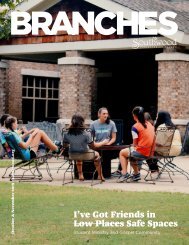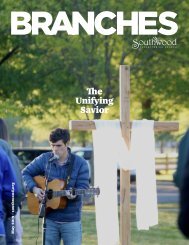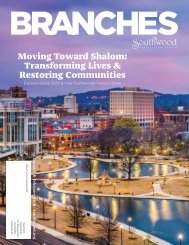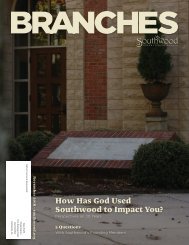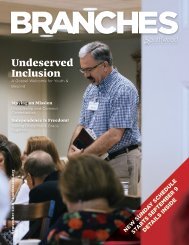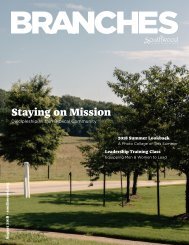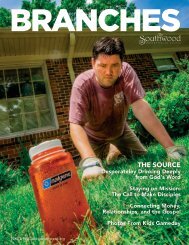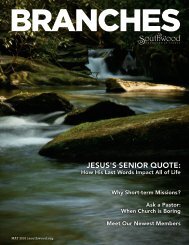Create successful ePaper yourself
Turn your PDF publications into a flip-book with our unique Google optimized e-Paper software.
SOUTHWOOD<br />
respond<br />
ASK A<br />
PASTOR<br />
Chad<br />
Townsley<br />
Answering questions<br />
about college kids’<br />
involvement with<br />
ministry while at school.<br />
What are some ministry resources that<br />
you would recommend for a college<br />
student today?<br />
The number one recommendation I always give is Reformed<br />
University Fellowship (RUF). This ministry, being the official<br />
college ministry of our denomination, is dedicated to<br />
teaching reformed biblical doctrine. Another strength of<br />
RUF is the way in which it models a biblical world and life view as<br />
its campus ministers and interns shepherd college students in their<br />
everyday lives to equip them in grace. In addition to RUF, both Campus<br />
Crusade and Campus Outreach have a positive presence on hundreds<br />
of campuses across the country. All three of these ministries succeed<br />
in prioritizing the great commission by moving towards unbelievers on<br />
their respective campuses.<br />
What are some of the most important theological concepts a high school student<br />
needs to understand as they transition to college?<br />
First, God is in control of everything. Most high school<br />
seniors have yet to face the type of life challenges and<br />
questions of faith that the age and stage of college brings.<br />
Our students must wrestle with this pivotal piece of doctrine<br />
as they choose career paths, take leaps of faith in new friendships and<br />
geographical locations and as they potentially seek a spouse. Daniel<br />
4:34-36 tells us of a God who is orchestrating his work through his<br />
kingdom for all eternity. College students need to understand they<br />
are a part of a much larger story, with a loving, caring, powerful God<br />
executing a plan for their lives.<br />
Second, it’s okay that they are not okay. One of the biggest lessons<br />
that a college student will ever learn is just how much they don’t know<br />
about life and just how much help they are going to need along the<br />
way as they transition to adulthood. The hardest part of learning this<br />
concept is realizing that this posture of daily need is precisely where<br />
God wants us. Jesus explains in Mark 2:17 that he has come for the<br />
sick, not the well. It is so easy for college aged individuals (and the rest<br />
of us for that matter) to believe that we have/had the world by the tail<br />
in our early twenties. At some point, whether it is through a broken<br />
relationship, the failure of a college class, a major life mistake or just<br />
Should a college student transfer<br />
their membership to a church in their<br />
college town?<br />
Generally speaking, yes, I encourage students to get<br />
invested in this way at a church in their college town.<br />
Our Book of Church Order (BCO) specifically addresses<br />
situations like that of a college student who resides in a location<br />
other than their hometown. BCO 46-4 explains that those who wish to<br />
retain their original communing membership may become associate<br />
members in their town of temporary residence. This membership<br />
status gives the individual all of the rights and privileges of a member,<br />
with the exception of voting in meetings and holding office (these<br />
rights are retained where they are full communing members). To join<br />
a church as a full-communing or associate member is very valuable<br />
as it establishes a formal relationship between the student and the<br />
church. This is particularly important as the student engages in the<br />
worship and work of the church (i.e. partakes of the Lord’s Supper)<br />
and as they require shepherding and care.<br />
the constant reproof of a roommate, our students will realize their need of<br />
a Savior. If not affirmed with the gospel of grace amidst the pressure to be<br />
okay, this life phase will drive students toward dark spiritual lies about how<br />
their performance shapes their identity.<br />
Third, sanctification grows best in community. God intends for us to grow<br />
through communities of his covenant people. Finding a Bible-believing<br />
church and Christian community of peers is vitally important as students<br />
navigate their questions of faith and the problem of their sin. These<br />
communities of sanctification need to be a place where students are not<br />
only affirmed in the gospel, but also challenged to grow because of it.<br />
Last, God’s going to fix it all. Although God’s work may be very clear during<br />
portions of our lives, we still need the hope of final redemption. As students<br />
learn the implications and tensions of the previous three theological<br />
concepts, they will need the promise that Jesus is going to fix it all upon<br />
his return. Revelation 21 details the final judgement and eradication of all<br />
the evil and wrong in our world. This passage is our hope and longing as<br />
we wrestle with God’s plan, realize our sin and work out our sanctification. In<br />
addition, it contains the promise that there is nothing we or anyone else can<br />
do to foil the work of redemption that God is doing and will do in the future.<br />
16 MAY <strong>2013</strong> | SOUTHWOOD.ORG






